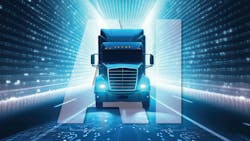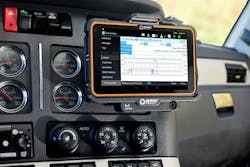In the trucking, transportation, and logistics industries, artificial intelligence is still an enigma to some. That’s not so much because it’s a puzzling concept but because it remains unclear how it can benefit your business. However, it’s becoming increasingly clear that AI-driven technology can support your needs and provide valuable capabilities.
Jean-Sebastien Bouchard, chief product officer and co-founder of Isaac Instruments, has a concise way of describing AI that immediately makes sense: “AI is predictive. It takes a large amount of data, more information than any person can be expected to manage, and turns it into an actionable tool.”
Trucking companies generate more data per truck daily than one person can read and process, Bouchard noted. Feeding that data into an AI model and training it to learn patterns continually can generate a predictive capability about drivers, operations, and trucks that would otherwise take much longer—or not even be possible.
Bouchard also described “blind spots” caused by the inability to “connect the dots” in a massive amount of data and use it to predict risky behaviors, crashes, claims, and vehicle issues. “Those are the things you can’t manage without the capability of AI models,” he explained. “What AI also brings is time savings because the more information we gather, the more people we need to manage it.”
Remarkable results
Ben Wiesen, president of freight management software provider Carrier Logistics Inc., noted that AI is being rapidly deployed throughout the supply chain to achieve remarkable results.
“Advanced AI-powered solutions are making a real difference in how trucking companies operate,” Wiesen said. “Complex decisions are now made by software systems that are available 24/7, which is a good thing for an industry that literally does work around the clock. Operations planning, which was previously exclusively done by dispatchers, has transitioned to optimization largely performed by computers.”
AI technology supports complex operations so trucking companies can efficiently service their customers while reducing service failures and lowering costs. As an example, Wiesen pointed to dispatch and routing decisions.
“Due to the time constraints involved in moving freight hundreds of miles overnight, geographical rules and fixed-route solutions were often used to keep things moving,” Wiesen said. “With an AI-driven route optimization module, however, CLI has enabled fleets to generate highly optimized P&D routes for irregular-route delivery fleets without causing any delays in the movement of freight through the network.”
Using the module, fleets can quickly determine which deliveries should be loaded on each truck and in what order. It creates precise route plans considering specialty equipment, appointment time windows, predicted traffic, and commercial vehicle routing.
“Deploying computerized route optimization significantly reduces the time to generate P&D routes each day because the system can route an entire terminal’s deliveries in just minutes, allowing deliveries to be loaded on trailers earlier,” Wiesen explained. “Better planning yields better visibility back to shippers, who can be informed earlier of ETAs or potential disruptions.”
“Historically, many hours of productivity have been lost by drivers and dockworkers who have been waiting for their next assignments,” Wiesen continued. “AI can make sure that dispatch and warehouse assignments are provided immediately so labor resources can be fully utilized.”
“And in an employment market where finding, training, and retaining drivers and forklift operators is challenging, the ability to do more without adding headcount can be the difference between leaving freight behind and handling more business,” he added.
In addition, AI automatically extracts data from scanned documents. Data entry and clerical hours have long been considered necessary for trucking operations. AI is replacing those costs.
CLI also uses AI to identify at-risk accounts, conserve resources, and reduce bad debt. The company’s Automated A/R Risk Scores solution looks at accounts receivable records much like an experienced A/R manager would, focusing on factors such as account age, payment history, open balance trends, and activity for each customer.
“The system does this automatically, and it can focus on all accounts all the time,” Wiesen said. “Even small-balance accounts with a potentially elevated collections risk that might otherwise have slipped through the cracks are brought to management’s attention before they turn into a collections problem.”
See also: Magnus Technologies AI optimizes truckload operations days in advance
Transformative power
At McLeod Software, Doug Schrier, VP of growth and special projects, noted that trucking has experienced the transformative power of AI across back-office operations and the driver's experience. The exponential growth of computing power is now poised to amplify AI's impact on the supply chain significantly.
“Imagine a future where AI seamlessly connects networks, automates responses, empowers efficient asset utilization, and frees humans from repetitive tasks,” Schrier said. “This transformed landscape is closer than ever, promising significant opportunities within the near future. In today's competitive landscape, technology like AI isn't just a nice-to-have; it's a game-changer.”
The power of AI goes beyond mere efficiency. In the trucking industry, Schrier related, relationships reign supreme, and AI is not here to replace those connections but to make them stronger. “Imagine AI-powered tools that personalize interactions, analyze customer preferences, and anticipate needs, allowing you to deliver an exceptional and customized experience for each customer,” he said.
McLeod expects to see AI in freight management technology in some key areas, according to Schrier:
- Dynamic route optimization: Real-time traffic, weather, and demand data will constantly adjust delivery routes. This will help ensure timely deliveries and increase utilization, which improves the efficiency of the supply chain and fleets. By integrating advanced analytical tools, decision support models, and AI, trucking companies will have opportunities to enhance planning, optimize performance, and improve execution.
- AI automatic response: Generative AI is poised to revolutionize communication within trucking and brokerage operations by automating responses to common requests. Imagine drivers receiving immediate answers to route inquiries or resolving simple issues without human intervention. Brokers and carriers could quote customer requests for shipment in mere seconds, tailoring responses based on past data and market trends. This eliminates tedious administrative tasks, frees up human expertise for complex situations, and streamlines operations for both truckers and brokers.
This is Part 1 of a two-part series. You can read Part 2 here.
About the Author

Seth Skydel
Seth Skydel, a veteran industry editor, has more than four decades of experience in fleet management, trucking, and transportation and logistics publications. Today, in editorial and marketing roles, he writes about fleet, service, and transportation management, vehicle and information technology, and industry trends and issues.


